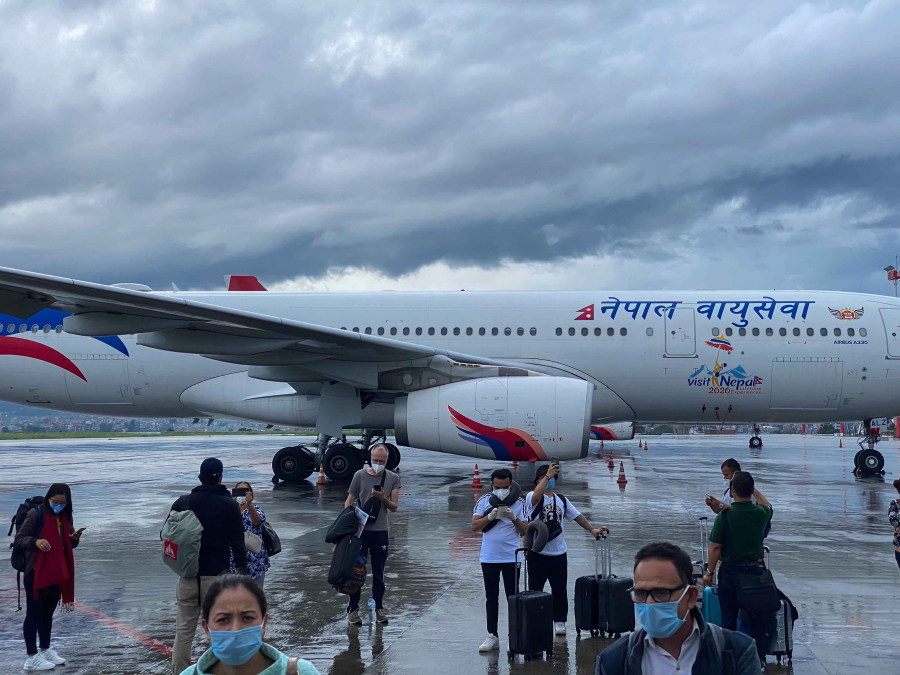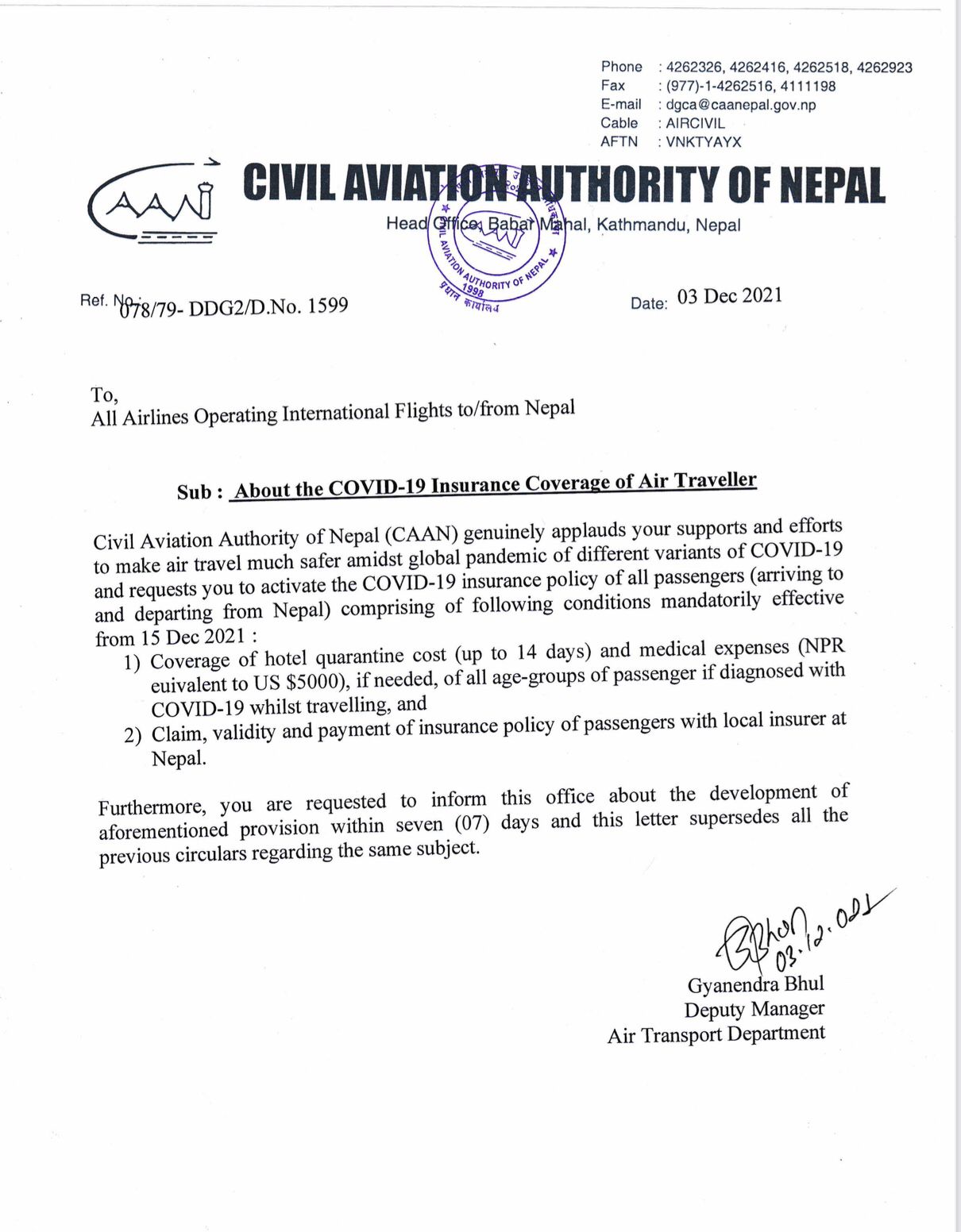Money
Airlines flying to and from Kathmandu must enforce Covid-19 insurance
The policy covers hotel quarantine costs up to 14 days and medical expenses up to $5,000, the CAAN says.
Sangam Prasain
All airlines flying to and from Kathmandu’s Tribhuvan International Airport must enforce the Covid-19 insurance policy from December 15, Nepal’s civil aviation regulator said.
“The Civil Aviation Authority of Nepal genuinely applauds your supports and efforts to make air travel much safer amidst global pandemic of different variants of Covid-19 and requests you to activate the Covid-19 insurance policy of all passengers (arriving to and departing from Nepal),” the circular dispatched to airlines reads.
"The Covid-19 insurance policy covers hotel quarantine costs up to 14 days and medical expenses up to $5,000, if needed, for all age groups of passengers if they are diagnosed with Covid-19 whilst travelling," the circular said.
“We have requested all international airlines to activate the Covid-19 insurance coverage,” said Gyanendra Bhul, deputy manager at the Air Transport Department of the Civil Aviation Authority of Nepal.
“This insurance policy has to be done by the airline companies, not the passengers,” he said. “The policy, in fact, will not bother travel agencies and passengers because the entire responsibility for the expenses of the passengers (hotel quarantine cost up to 14 days and medical expenses up to $5,000) should be taken by the airlines if the passengers get infected while travelling.”
Bhul said that the insurance policy contract would be between the airlines and the insurance companies. “The airline may charge a certain fee from their passengers.” According to him, from December 15 onwards, all airlines will insert a notification in the ticket issued to travellers: You are coming aboard with Covid-19 insurance.
This kind of insurance policy was introduced by some international airlines in some countries before, but was removed later following the vaccination drive, said Bhul. “With the concern of Omicron rising, some airlines have reintroduced the policy.”
Nepal had also enforced Covid-19 insurance before, but for mountaineers and trekkers only.
Earlier, trekkers and mountaineers arriving in Nepal were required to undergo mandatory seven-day hotel quarantine, and have a second negative PCR test on the fifth day after arrival. The government had made it mandatory for trekkers and mountaineers to possess insurance coverage worth $5,000.

However, on September 23, Nepal threw away the seven-day quarantine requirement and resumed issuing on-arrival visas to all vaccinated foreign travellers in a bid to bring its virus-ravaged tourism industry back to life. The insurance requirement was also removed.
Visitors should have received their last dose of the Covid-19 vaccine at least 14 full days prior to entering Nepal.
Those who are not vaccinated or partially vaccinated will not get on-arrival visas. They have to get their entry permits from Nepali diplomatic missions, and also spend 10 days in quarantine in government-listed hotels.
A negative RT-PCR or Gene Expert or True NAAT test is required for all to travel to Nepal.
The new protocol was issued under the Infectious Disease Act 1964, after the Covid-19 Crisis Management Ordinance 2020, along with around a dozen ordinances, introduced by the government, became ineffective from September 16 when they failed to get through Parliament within the constitutional deadline.
According to Bhul, the civil aviation regulator had originally planned to enforce the insurance policy from January 1. “We had to prepone the decision following the Civil Aviation Ministry's request to bring it forward to December 15.”
The decision, however, was taken before the World Health Organisation declared Omicron a SARS-CoV-2 variant of concern.
The world is again dealing with a new variant of the novel coronavirus, this time called Omicron.
Many countries swiftly imposed border restrictions and flight bans to buy some time as scientists try to decipher this new variant’s implications for public health.
The first confirmed Covid-19 case with the Omicron variant—identified as B.1.1.529—dates to November 11 in Botswana.
South African scientists detected a small number of the variant in samples collected between November 14 and 16, prompting them to report their findings to the WHO on November 24.
On November 26, the WHO declared Omicron a SARS-CoV-2 variant of concern.
Following the development, effective from December 2, Nepal issued travel restrictions for people arriving from South Africa, Hong Kong, Zimbabwe, Botswana, Namibia, Lesotho, Eswatini, Malawi and Mozambique as the first port of embarkation or transit or with travel history of such countries within the past three weeks.
Nepal on Monday reported two Omicron cases.
According to the Ministry of Health and Population, a 66-year-old foreign national, who entered the country via Tribhuvan International Airport on November 19, and a 71-year-old man, who came in close contact, have tested positive for the Omicron variant.
The ministry said that the polymerase chain reaction tests of both individuals had come back negative at the airport health desk. They were fully vaccinated.
The two foreign nationals who were infected with the Omicron variant have tested negative, the Health Ministry said on Wednesday.




 20.12°C Kathmandu
20.12°C Kathmandu














